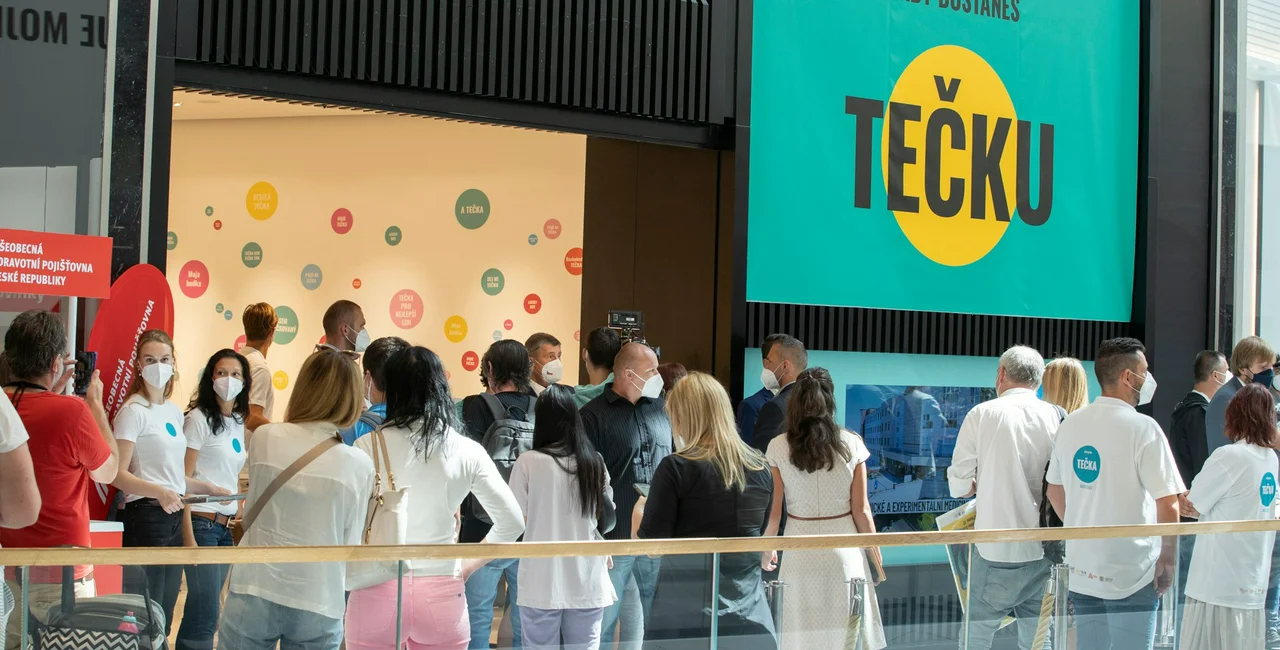More walk-in vaccination centers to open including in Smíchov
Another vaccination center without registration will open on Monday in the shopping center in Smíchov, Health Minister Adam Vojtěch said on Wednesday. Other places will be decided in the next few days. According to Vojtěch, however, these must be areas where there is a large flow of people, such as shopping centers or the centers of larger cities.
"This cannot be done absolutely everywhere as there must be logistics for the storage of the vaccines. This also must be approved by the public health office as health services are provided," he added
Some current vaccination points might vaccinate those who were not registered in advance, Vojtěch said. Recently, centers for the unregistered opened at the Prague’s main railway station Hlavní nádraží and the Westfield Chodov shopping mall. Next week, more centers are likely to be established at the Brno-Královo Pole, Ostrava, Hradec Králové and Kolín railway stations.
O oÄkovánà bez registrace je obrovský zájem. A my jsme za to moc rádi! V pondÄ›là proto otevÅ™eme dalÅ¡Ã takové oÄkovacà mÃsto. Bude v obchodnÃm centru na pražském SmÃchovÄ›. Zajistà ho @FnMotol. OtevÃracà doba: 9-20h. Kapacita: 250-300 lidà dennÄ›. A plánujeme je i v dalÅ¡Ãch mÄ›stech.
— Adam VojtÄ›ch (@adamvojtechano) July 14, 2021
Long lines at walk-in vaccination centers
Interest in vaccination against Covid-19 without registration in the centers at the main railway station Hlavní nádraží and in the Westfield Chodov shopping center persists. The Institute of Clinical and Experimental Medicine (IKEM), which operates the center in Chodov, on July 14 on Facebook called on people to postpone the visit due to great interest. The line was more than 150 meters and the waiting time exceeds two hours. People can check the length of the wait online and get other details. On Monday, when the center opened, about 600 people were vaccinated there, on Tuesday 800 and Wedesday they expect an even higher number.
The center at the main railway station, which is operated by the Bulovka University Hospital, also attracted great interest and queues. The line in front of the vaccination center at the main railway station ion Wednesday morning was about 45 minutes. In the afternoon, the hospital wrote on Twitter that the daily capacity is up to 500 people. At the mall, they are vaccinated with Pfizer/BioNTech vaccine, which is given two doses 21 days apart. At the station, paramedics give the one-dose Janssen vaccine.
NaÅ¡e oÄkovacà mÃsto na Hl. nádražà hlásà enormnà zájem. PÅ™estože jsme rozÅ¡ÃÅ™ili provoznà dobu na 7.00–19.00 a posÃlili personál, tvořà se fronty, a lidé tak mohou Äekat delÅ¡Ã dobu. DennÄ› zde oÄkujeme až 500 osob a zhruba stejný poÄet pak pÅ™Ãmo v OÄkovacÃm centru ve FNB. pic.twitter.com/lcfjbVjaKM
— Fakultnà nemocnice Bulovka (@NaBulovce) July 14, 2021
Over 4 million fully vaccinated
Some 4,040,306 have completed their vaccination, with 3,938,491 having two doses of vaccine and 101,815 having the single-dose Janssen vaccine from Johnson & Johnson. Recently vaccinated people will have to wait two weeks for the doses to become fully effective. There are 10.65 million people in the Czech Republic, so the number of fully vaccinated is 38 percent. In total, 9,252,732 doses of vaccine have been administered including 91,278 on Wednesday. Of those, 68,857 were second doses or Janssen, completing vaccination. Since the start of vaccination at the end of 2020, some 82.6 percent of the doses administered have been Pfizer/BioNTech, while Moderna is at 8.7 percent and Astrazeneca at 8.6 percent. The single-dose Janssen vaccine is only at 1.1 percent.
Newly registered people will receive a second dose in 21 days
From today, those newly registered for vaccination against Covid-19 will again receive the date of the second dose 21 days after the first. So far, this has been 34 to 42 days for Pfizer/BioNTech. For other vaccines, the spacing does not change. Until the end of March, the interval between the first and second dose of Pfizer/BioNTech was exactly 21 days. After that, the Health Ministry extended it to 42 days, so that at least the first dose was given to as many people interested in vaccination as possible in the shortest possible time. At the end of June, the ministry allowed people to shorten the deadline to 34 days. However, they had to call the 1221 vaccination information line. Registrants who have already received the first dose or already have an appointment cannot shorten the vaccination interval. It is only allowed for children aged 12 to 15, who could become fully vaccinated at the beginning of the school year.
Two-thirds view Covid as biggest threat to the Czech Republic
Sixty-five percent of Czechs said Covid-19 is the biggest real threat for the country, while 48 percent of the interviewed are worried the most about economic crises, and one quarter fear wars, raw material shortages, and natural disasters most of all, a CVVM poll showed. In comparison with November 2019, four months before the epidemic outbreak in the Czech Republic, 34 percentage points fewer people listed epidemics as the most serious threat, while economic crisis was cited by 39 percent. The CVVM poll was conducted on a sample of 1,000 people over 15 from early May to mid-June.
Compulsory quarantine for unvaccinated suspended in Slovakia
The Slovak Constitutional Court confirmed that on Tuesday it had suspended the validity of the chief public health officer's directive demanding mandatory quarantine for all entering Slovakia who were not Covid vaccinated. The court argued that a temporary exception was granted also to the persons after the first dose of the vaccine. After the first dose of the vaccinating agent, people did not have antibodies against Covid to be protected against the illness, the court said. Under the directive, the travelers with this would not have to enter the quarantine for one month after the directive is issued. The court also renewed the validity of the directive of the chief public health officer under which quarantine measures are mainly guided by the state from which the relevant person arrives to Slovakia and whether such people have a coronavirus test. The new anti-epidemic regime sparked protest events at several Slovak border crossings. Furthermore, many unvaccinated Czech and Polish travelers decided to cancel their holiday in the country.
Chief hygienist: Night clubs, population density a problem in Prague
The higher numbers of Covid cases in Prague is mainly due to the high population density, according to Pavla Svrčinová, the Czech Republic's chief hygienist. She told daily Mladá fronta Dnes the disease is spreading in Prague largely among young people. The reasons include insufficient vaccination coverage of this age group, because registration for them started relatively recently and interest has been low. Nightclubs are also risky because a large number of people are concentrated in a small space, and there is alcohol consumption.
Pandemic numbers improve slightly
Some numbers improved slightly, but the pandemic is still continuing to spread. Ther number of new cases for Wednesday was 266, down from 318 on Tuesday, and also down from 278 on the previous Wednesday. The reproduction number R dropped down to 1.31, its lowest since July 10. the number of people hospitalized dropped from 30 to 37, and no deaths were reported. The nationwide index number of new cases per 100,000 people in seven days stayed steady at 16. The PES number, which is no longer used to set policy, dropped one point to 56. In Prague, the index number dropped from 43 to 41, while in Plzeň, which is also hard hit, the index number dropped to 37 from 38.
Latest Covid-19 data from the Czech Ministry of Health (July 15, 2021)
- New cases 266
- Deaths 30,335
- Currently hospitalized 27
- PCR tests performed 8,427,655
- Antigen tests performed 22,743,214
- Total vaccinations 9,252,732
- Daily increase in vaccinations 91,278
- People who have completed vaccination 4,040,306
- New cases per 100,000 in seven days 16
- PES index 56
- R number 1.31












 Reading time: 5 minutes
Reading time: 5 minutes 





























